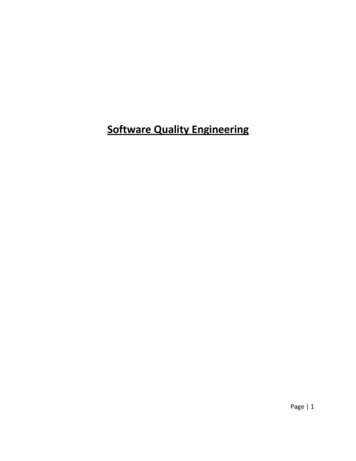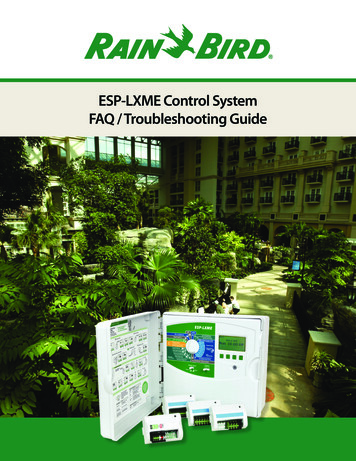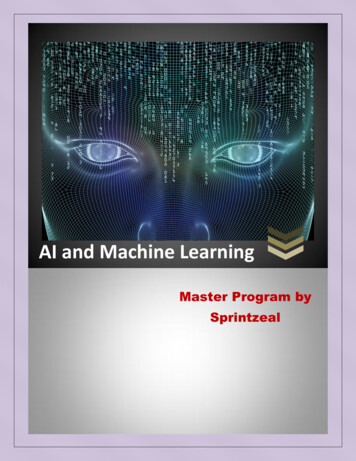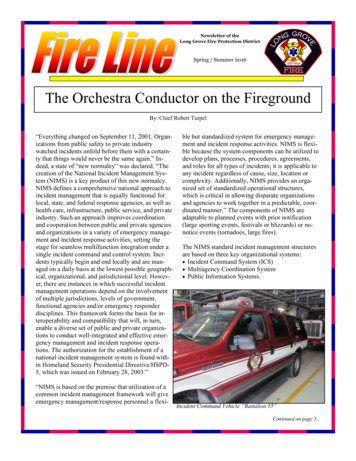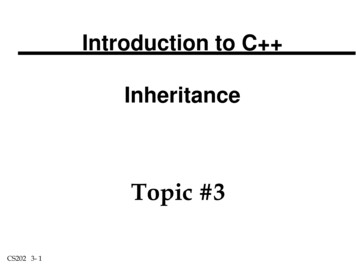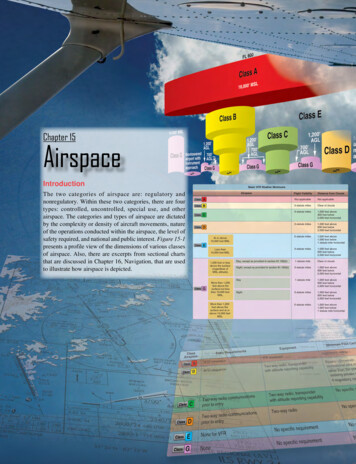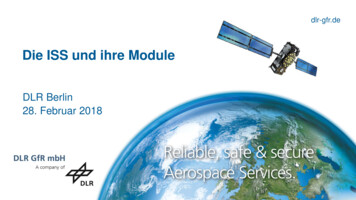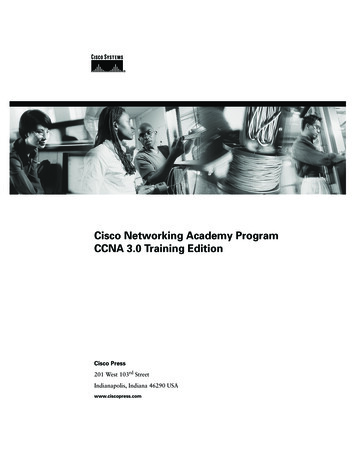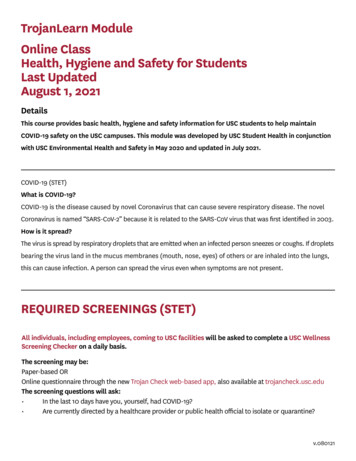
Transcription
TrojanLearn ModuleOnline ClassHealth, Hygiene and Safety for StudentsLast UpdatedAugust 1, 2021DetailsThis course provides basic health, hygiene and safety information for USC students to help maintainCOVID-19 safety on the USC campuses. This module was developed by USC Student Health in conjunctionwith USC Environmental Health and Safety in May 2020 and updated in July 2021.COVID-19 (STET)What is COVID-19?COVID-19 is the disease caused by novel Coronavirus that can cause severe respiratory disease. The novelCoronavirus is named “SARS-CoV-2” because it is related to the SARS-CoV virus that was first identified in 2003.How is it spread?The virus is spread by respiratory droplets that are emitted when an infected person sneezes or coughs. If dropletsbearing the virus land in the mucus membranes (mouth, nose, eyes) of others or are inhaled into the lungs,this can cause infection. A person can spread the virus even when symptoms are not present.REQUIRED SCREENINGS (STET)All individuals, including employees, coming to USC facilities will be asked to complete a USC WellnessScreening Checker on a daily basis.The screening may be:Paper-based OROnline questionnaire through the new Trojan Check web-based app, also available at trojancheck.usc.eduThe screening questions will ask: In the last 10 days have you, yourself, had COVID-19? Are currently directed by a healthcare provider or public health official to isolate or quarantine?v.080121
SCREENING QUESTIONSYESNODo you currently have any of the following symptoms: Chills or Fever of 100 degrees or higher Loss of Taste or Smell Muscle Soreness or Headaches Cough or Runny Nose or Sore Throat Difficulty Breathing or Shortness of Breath Conjunctivitis (inflammation of eye including redness, itching andtearing) ALONG WITH feeling feverish GI symptoms such as Abdominal Pain or Diarrhea or Nauseaor VomitingComplete this section if you are NOT fully vaccinated*: In the past 14 days, have you had close contact with a person knownto have COVID-19? Have you traveled in the past 10 days(if you have not had a negativeCOVID test) or 7 days (if you have received a negative COVID test atleast 3 days after returning) ?*Fully vaccinated means at 2 weeks after your second dose in a 2-dose series,such as the Pfizer or Moderna vaccines, or 2 weeks after a single-dose vaccine,such as Johnson & Johnson’s Janssen vaccineVaccinesThe COVID-19 vaccines are safe, effective, and one of the most important tools in ending the pandemic.Vaccines protect against severe COVID-19 disease, hospitalization, and death. Vaccinations cut downthe ability of the virus to keep infecting people and mutate into vaccine-resistant strains.Vaccinated individuals are not required to quarantine after a COVID-19 exposure. They are highly recommended to test as a public health precaution.USC requires all students*, faculty, and staff to complete a COVID-19 vaccination, or submit a request fora medical exemption or religious exemption. Individuals with approved exemptions must wear masks oncampus, quarantine after travel and comply with regular COVID-19 testing (weekly for faculty, staff andgraduate students; twice weekly for undergraduate students).
Face CoveringsAll persons on campus must wear face coverings indoors, including in all healthcare facilities, and on transportation such as buses and shuttles, or as directed by current USC policies, guidelines, and protocols.All persons on campus properties must wear a face covering, except if alone in a private office. Masks maybe removed briefly while eating or drinking provided 6 feet of distance can be maintained from others.All individuals may wear masks if they choose, without fear of retaliation and at no cost to universityemployees, (faculty and staff, including student workers), and are advised to follow current guidancefrom the University and the Los Angeles County Department of Public Health on general precautions. COVID-19 is an airborne disease. Physical distancing, face coverings, increased ventilation indoors, andrespiratory protection decrease the spread of COVID-19, but are most effective when used in combination.Face coverings and Respirators Face coverings (cloth masks, surgical masks) are not respiratory protective equipment. Face coverings areintended to protect other individuals from the wearer (potential source of droplets) of the face covering.This is called “source control.” N95s and more protective respirators protect the users from airborne disease while face coveringsprimarily protect people around the user.All university employees (faculty and staff, including student workers) may request N95 respirators forworking on campus. Employees should review the video for how to properly wear a respirator and howto perform a seal check. Be advised of the fact that facial hair intereferes with a seal.The mask guidelines are subject to change in the event new cases or outbreaks are identified in Los Angeles or at USC. All students, faculty, staff, and guests must comply with the campus mask guidelines orbe subject to disciplinary action.OR, if you are instructed to wear PPE (personal protective equipment) for your job, wear your assigned PPEprior to beginning your work. Donning and doffing of PPE should occur while an employee is “on the clock”. Wash your hands after “taking off” (doffing) a face covering, isolation mask, or your assigned PPE. Place used cloth face coverings in a plastic bag for washing. Learn more about hygiene and PPE on the Environmental Health and Safety resource page
Hand HygieneRemember to wash your hands.1. Wash or sanitize your hands every 30 minutes, especially when coming into contact with commonsurfaces or shared items (tools, screens.)2. Handwashing with soap and water for 20 seconds greatly reduces the risk of spreading infection(wash all surfaces of your hand, fingers, nails, up to the wrists)3. Before, during, and after preparing food; before eating food4. Before andaftercaringfor someone who is sickCloseContactExposure5. After using the bathroom; blowing your nose, coughing, or sneezing; handling garbage; touching animalsClose contact exposure is defined as being within 6 feet of someone for a total of 15 minutes within a 24period.Close Contact ExposureIf youare notisfullyvaccinated,a physicaldistance6 feetoffromothers canhelpa reduce riskClose contactexposuredefinedas beingmaintainingwithin 6 feetof someonefor aoftotal15 minuteswithintransmission.24-hour period.If you are not fully vaccinated, maintaining a physical distance of 6 feet from others can help reducerisk of transmission.SYMPTOMS (STET)SYMPTOMS (STET)This list is not all possible symptoms. Please call your healthcare provider for any other symptoms that are severe or concerning to you.
Households A household is defined as a group of people who live together in a single dwelling unit like a home orapartment. These individuals usually share the use and responsibility for common living areas and sharedaily household activities and responsibilities. The following are excluded from the definition of a household: dormitory, fraternity, sorority, monastery,convent, or residential care facility (these are institutional group settings). The definition also excludesco-living suites, boarding houses, hotels, or motels (these are commercial group living arrangements). Students are directed to follow all current University, Los Angeles County, and State of California publichealth guidance on restricting the mixing of householdsTravelTravel remains a high risk in the transmission of COVID-19 between communities, especially if you arenot fully vaccinated. At certain periods when the case rate is high, public health authorities may institute required or advise voluntary actions to limit travel and reduce the risk to the public. Monitor your USC email for important alerts regarding travel and other COVID-19 related updates fromUSC Student Health. If you choose to travel, read the safer domestic travel guide prepared by USC Environmental Healthand Safety. If public health guidance requires screening and testing prior to travel, plan enough time to receiveyour results BEFORE departure. Do not travel if you have not received clear results. Test upon arrival, ifpossible.Delay travel if you are sick or exposed. Anyone feeling ill, recently diagnosed with COVID-19 (within 10days), or exposed to someone with COVID-19 (within 14 days) should self-isolate and delay travel. Followguidance from your health care provider regarding when recommended isolation/quarantine periods arecomplete, and travel can be safeDelay travel if you are not fully vaccinated. Not fully vaccinated individuals must quarantine for 7 days andbe tested for COVID-19 within 3-5 days after travel before returning to campus.COVID-19 - “I’ve been exposed to a positive case.”“I’m vaccinated”If you are vaccinated (USC faculty, student or staff) and are notified that you have been exposed tosomeone who tested positive for COVID-19 should follow the instructions below:1. You are strongly recommended to test as soon as possible, visit https://usc.edu/myshr to schedulea test.2. We recommend you take your temperature 2 times a day (every 12 hours) and monitor for the followingsymptoms: fever, runny nose, sore throat, coughing, difficulty breathing, mild diarrhea, loss of tasteor smell.
Any not fully vaccinated USC student who is notified that they have been exposed to someone whotested positive for COVID-19 should follow the instructions below:Stay at home — do not go to class, work, practice or any other activity.1. You must quarantine for 10 days as directed by the Los Angeles Department of Public Health.2. Arrange for testing through USC Student Health. No other notification is required to USC.3. We recommend you take your temperature 2 times a day (every 12 hours) and monitor for the followingsymptoms: fever, runny nose, sore throat, coughing, difficulty breathing, mild diarrhea, loss of taste or smell.If you develop symptoms, we encourage you to: Arrange for testing: COVID-19 testing is available at USC:No notification toUSC COVID HotlineRequiredCall USC Student Health:213-740-9355 (WELL) or schedule through usc.edu/myshr.QUESTIONS? Call the USC COVID-19 hotline at 213-740-6291 Email: covid19@usc.eduCOVID-19 - “I am feeling sick.”All USC students should monitor their health during the time of COVID-19. If you are feeling sick withrespiratory symptoms, including the COVID-19 symptoms listed from the previous slides, follow theinstructions below: Stay at home — do not go to class, work, practice or other activity. Schedule testing through USC Student Health usc.edu/myshr at a Pop Testing location. You must isolate at home until you have been fever-free for 24 hours (without using a fever-reducingmedicine) and 10 days have elapsed from the onset of symptoms. If you did not have any symptomsand only a positive test, you must isolate at home until 10 days have elapsed from the date of the test.You must isolate at home until all your symptoms have been resolved for at least 3 days AND 10 dayshave elapsed from the onset of symptoms.COVID-19 testing is available at USC:Students/General/UPC Employees, schedule testing through USC Student Health.Call for Testing atUSC Student HealthSTUDENTS: Go to: usc.edu/myshr Call USC Student Health at 213-740-9355 (WELL).
COVID-19 “I tested positive.” Stay at home — do not go to class, work, practice or other activity. All USC students who have been present in campus facilities or participating in campus programswho have tested positive for COVID-19 must self-report and notify the university. USC students who are tested through USC Student Health may skip the notification steps listed below. To self-report and notify the university, contact: COVID-19 hotline at 213-740-6291 or email covid19@usc.edu Upon contacting the university, you will be asked to provide details of your USC-related activities, identifyother USC faculty, staff, teaching assistants, research assistants, resident assistants, and students withwhom you have had contact and where, the date of your diagnosis, and the date of symptoms onset. Thisinformation will only be shared with those who need to know to address health and safety considerations. Identify WHERE (USC locations) you have been within the last 48 hours before your symptoms beganor date of positive test if you are asymptomatic. Identify people WHO you have had close contact (within 6 feet, for 15 minutes or longer) within the last48 hours before your symptoms began.NOTIFY USCor emailcovid19@usc.eduSafetyCOVID-19 Hotline:213-740-6291covid19@usc.edu All students must follow all health and hygiene guidance of the University as posted on the coronavirus.usc.edu website and issued by USC Student Health. Stay informed—check your USC email regularly for updates from the university Visit coronavirus.usc.edu for information, including links to current health and hygiene recommendations, mental health resources, and updated screening process instructions.
Information on COVID-19 Safety in Accordance with Cal/OSHA Title 8 Section 3205(5) Particles containing the virus can travel more than six feet, especially indoors, so physical distancing, face coverings, increased ventilation indoors, and respiratory protection decrease the spread ofCOVID-19, but are most effective when used in combination.If you are a current employee/subcontractor experiencing COVID-19 symptoms or have been exposedto someone with COVID-19, with appropriate notice, you will not be disciplined for not coming into work.Your health is our top priority and we remain committed to providing a safe environment for all of ouremployees. As an employee of the University, you may be entitled to several different types of leave or benefitsincluding the following: Family Medical Leave California Family Rights Act Leave Workers’ Compensation State and Local COVID-19 Supplemental Paid Sick Leave California Paid Sick Leave Exclusion pay under the Cal/OSHA Emergency Temporary Standards on COVID-19 Disability Insurance Long Term Disability Other state provided paid benefits, such as State Disability Insurance (SDI), unemployment benefits,and/or California Paid Family LeaveYou can learn more about the leaves/benefits you are entitled to on our COVID-19 website. For additionalleaves/benefits information, you may also contact your HR Partner.Please be advised that the University is committed to providing a safe and transparent community wherediscrimination, harassment, and retaliation are strictly prohibited. This includes harassment of or discrimination against individuals for COVID-19-related reasons, including but not limited to an individual’sexposure or possible exposure to COVID-19, showing symptoms of COVID-19, testing positive for COVID-19,and/or taking a leave of absence for COVID-19-related reasons. More information on the University’santi-discrimination and anti-retaliation policies are available online.Your health is our top priority and we are continuing to ensure your health and safety with frequentenhanced cleaning and routine disinfection of areas identified during contact tracing. If you would likemore information on the cleaning of buildings at USC, please visit the Office of Environmental Health &Safety’s website where you can view a guide sheet on enhanced cleaning during COVID-19.Information about community spread of COVID-19 is available on our COVID-19 website. General questionsalso can be directed to the COVID-19 hotline at 213-740-6291 or emailed to covid19@usc.edu.
Student Expectations1. To protect yourself and the greater community, the University expects every employee to comply with allinformation contained in this training and the principles of the Trojan Commitment. Students who test positive for COVID-19 must adhere to recommendations from the contact tracingteam at USC Student Health; these recommendations may include self-isolation for up to 14 days andnotification to USC individuals who may have had potential exposures.2. Failure to comply with the training and policies may result in discipline, revocation of privileges includingaccess to campus services, cancellation of USC Housing contract, and/or dismissal in accordance withapplicable University policies or agreements.Community ExpectationsThe safety of the entire USC community rests with each of us. In addition to the hygiene and health guidance listed previously in this module — wearing face coverings, adhering to physical distancing signageand instructions, following hand hygiene and illness protocols — the USC community is counting oneach student to safeguard each other’s lives and well-being by reducing risks as follows: Accurately reporting all symptoms of illness and self-isolating until you can be tested. Stay home whenyou are sick, wear a facial covering and visit a Pop Testing site for COVID testing. Following the campus mask policy. Facial coverings are required in healthcare facilities, on transportation,and in the event of an outbreak. Respecting the health concerns of others who you may be impacting by coming into close proximity withthem — roommates, suitemates, housemates, classmates, lab/performance/athletic practice partners,faculty, staff, neighbors, and others in the community. If others express discomfort with your noncompliance with established health and hygiene guidance from the University, including wearing face coverings,you are expected to change your actions and comply. Eliminating exposure to others from your respiratory (nose and mouth) droplets: cover your coughs andsneezes, cough or sneeze into your elbow to protect others; dispose of used tissues in trash bins; wash orsanitize your hands; do not share food/drinks or utensils; do not eat during class. Actions that disregard University health, hygiene and safety measures and put members of the USC community at heightened risk of illness may result in discipline, revocation of privileges including access tocampus services, cancellation of USC Housing contract and/or dismissal in accordance with applicableUniversity policies or agreements.Additional Resource Links USC COVID-19 Resource Center USC Environmental Health and Safety Dept. COVID-19 Resource Page CDC Hand-washing Recommendation CDC COVID-19 Website
Multiple Choice Quiz01/05: Unvaccinated individuals are required to:A. Wear a mask on campusB. Test regularly for COVID-19C. Maintain frequent handwashing habitsD. All of the above02/05: Vaccinated individuals:A. May skip quarantine if they have a close contact exposure to COVID-19B. Are protected against severe COVID-19 disease, hospitalization, and deathC. Both A and B03/05: The following are true statements:A. Close contact is being within 6 feet of someone for a total of 15 minutes or longer within a 24-hour periodB. Face coverings are required for indoor settings on campus or as directed by current guidelines.C. Symptoms of COVID-19 may include fever, cough, headache, gastrointestinal distress, fatigue,and loss or taste and smellD. All of the above04/05: The university will use the following methods to share important updates:A. USC emailB. Coronavirus.usc.edu websiteC. Morse CodeD. A & BE. All of the above05/05: If I have questions about USC’s current COVID-19 disruptions, I should:A. Send an email to covid19@usc.eduB. Visit the coronavirus.usc.edu websiteC. A and BD. Ask my next-door neighbor
USC COVID-19ACKNOWLEDGMENT/CONSENTFor Students:I have completed USC’s COVID-19 training entitled “Health, Hygiene and Safety,” and I have reviewed USC’sCOVID-19 health and safety policies and guidelines. I understand and agree to comply with all of USC’sCOVID-19 health and safety protocols and procedures, as described in that training and those policies,including but not limited to:1. Completing the USC Symptom Monitoring Survey each day before being physically present in any USClocation or participating in USC programs and activities.2. Wearing a facemask or covering at all times on campus except when alone in a room.3. Complying with use of all required personal protective equipment (PPE).4. Following all public health guidelines as set forth by USC.5. Following disinfecting protocols as set out by USC.6. Following USC reporting guidelines if I am diagnosed with COVID-19: Anyone present in campus facilitiesor participating working in campus programs who has tested positive for COVID-19 at an outside facilitymust self-report the positive COVID-19 test result immediately on the COVID-19 hotline at 213-740-6291or email covid19@usc.edu. You will be asked to provide details of your USC-related activities, contactwith other USC employees and students, the date of your diagnosis, and the date of symptoms onset.I understand that complying with the training and policies is a part of my responsibility to protect myself,and by doing so, protect others in my community during the pandemic. I understand that failure to complywith the training and policies may be treated as a non-academic violation of the University’s Student ConductCode and result in disciplinary action, up to and including expulsion.I also understand and acknowledge that, despite the health and safety measures that USC is instituting tohelp protect staff, faculty, students, and campus visitors from COVID-19, an inherent risk of exposure toCOVID-19 exists in any public place where people are present. COVID-19 is an extremely contagious diseasethat can lead to severe illness and death. I understand and acknowledge that entering campus or any otherpublic place for educational purposes (such as fieldwork or clinical site) may expose me to a variety of hazards andrisks foreseen and unforeseen related to COVID-19 and that I may expose those within my household or withwhom I interact to the same. I enter such public place voluntarily, fully knowing and understanding thesehazards and risks.
covid19@usc.edu COVID-19 "I tested positive." Stay at home — do not go to class, work, practice or other activity. All USC students who have been present in campus facilities or participating in campus programs who have tested positive for COVID-19 must self-report and notify the university. WHO usc.edu


